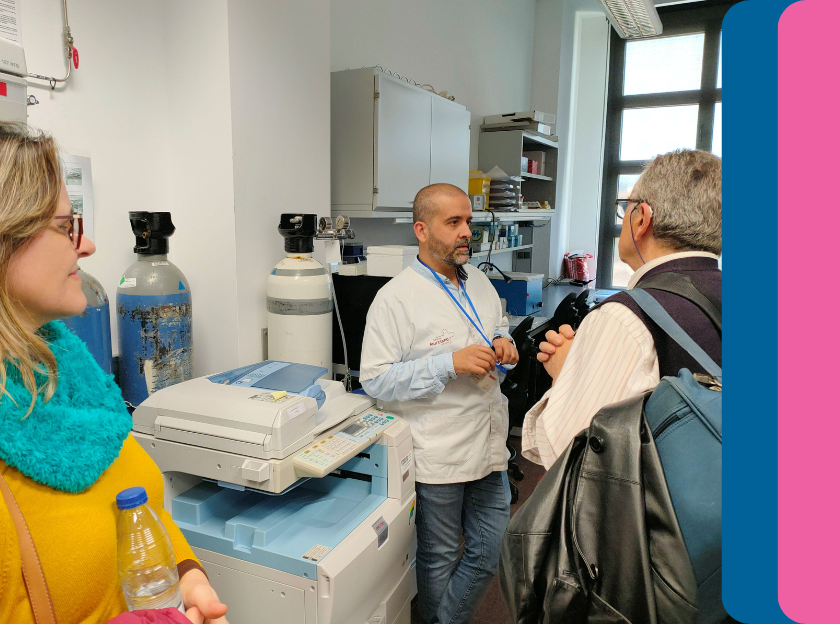The course "Advances in Biomedicine" ends in the UNED Classroom in Torrevieja with a visit to university laboratories

Yesterday, Saturday, March 23, the Advances in Biomedicine course, taught by Dr. María Luisa Molina Gallego, ended with a brain workshop and a thorough visit to the laboratories of the Murcian Institute for Biosanitary Research (IMIB) and the Virgen de la Hospital. Arrixaca.
This activity, organized by the UNED Classroom in Torrevieja and endorsed with certification for teachers by the Cefire of Orihuela with 33 hours of specific training, has been designed by the Torrevieja researcher María Luisa Molina, a specialist in one of the so-called rare diseases , Rett syndrome. This syndrome, which mainly affects women, consists of a neurological genetic disorder that causes the progressive loss of motor and speech abilities in childhood. Babies reach normal development, but after approximately six months, they lose the skills of crawling, using their hands or communicating. In a very creative way, Dr. Molina investigates treatments based on the direct study of the baby teeth that babies lose.
Throughout the course, Molina delved into the health applications that use the discoveries of CRISPR, detected, in his doctoral thesis, by the macrobiologist from Elche, candidate until 2022 for the Nobel Prize, Francisco Juan Martínez Mojica, Francis Mojica . In 2022, the Nobel Prize in Chemistry was awarded to two of her outstanding followers, the American Jennifer Doudna and the French Emmanuelle Charpentier, for their gene editing methods. CRISPR (Clustered Regularly Spaced Short Palindromic Repeats) is a family of DNA sequences found in certain bacteria, prokaryotes. With the manipulation of CRISPR in the laboratory, advances are achieved in the treatments or possible cures of diseases such as cystic fibrosis, anemia, beta-thalassemia, or prevention of HIV that causes AIDS, certain schizophrenia, etc. CRISPR Cas9 is being successfully applied to detect tumorigenesis.
Currently, Dr. María Luisa Molina is in charge of promoting the Natural History Museum (MHN) of Torrevieja. The visit, with your expert guide, is always enjoyable and edifying. The MHN should be a stay that expands the cultural offering of Torrevieja: it is a small exhibition, but with great effect. It is located in a building of the old railway station: the Albatera-Torrevieja train or shuttle. The museum contains unique pieces. Its origin was a donation from a foreign couple, residing in the city. The original professional determination of the doctor and municipal biologist Juan Antonio Pujol is now followed by the pedagogical explanation of the Torrevieja scientist about the environment and the individuals of the marine and terrestrial fauna of our habitats. Also, on Friday, March 15, the biologist prepared a brain workshop; In this size, specimens of transparent brains and several experiments with mice could be seen.
The culmination of the Advances in Biomedicine course, the fourth course of the 2023-2024 Open University program, took place in the laboratories of the IMIB and the Virgen de la Arrixaca Hospital, throughout this Saturday, March 23. The students of the UNED Classroom in Torrevieja moved to neighboring Murcia. The group was received and guided by David García Bernal, doctor in Biology, scientist of excellence at the IMIB in basic and theoretical research, and by Miguel Blanquer, hematologist, doctor in Medicine, responsible for Advanced Therapies in Arrixaca, who dedicates his research main to the therapeutic application of stem cells.
Among the final conclusions and recommendations with which the course closed, it was requested that the UNED Classroom of Torrevieja expand its spectrum of cultural and scientific actions and try to study the possibility of supporting, in its plan for future agreements, the maintenance of the History Museum Born in Torrevieja and the opening of a research program on rare childhood diseases, such as the aforementioned Rett syndrome, with a stable scholarship that would honor Torrevieja's sensitivity.